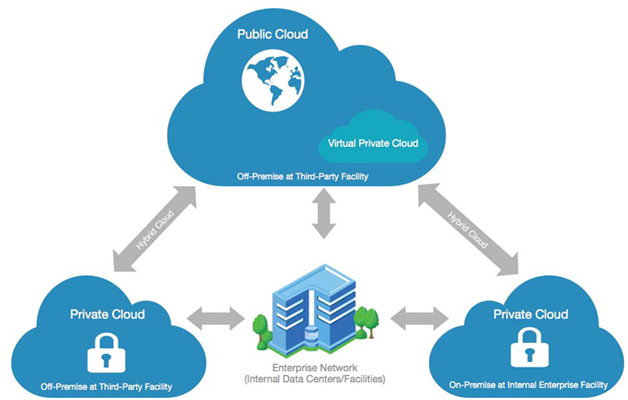While online data storage and on-demand resource availability can save companies a lot of money there are many companies, especially in the healthcare and finance sectors, which are still not keen to hand over their data to a third party. They are afraid their critical data will be hacked or accidentally lost or even stolen by rogue employees. But, today new solutions are coming out of which there is one which can verify the provider’s claim that the data will be safely kept in one’s own server. For instance, Amazon like many other cloud hosting service providers offers a private cloud service where the customer can get his own separate server. So, in short, cloud computing has dramatically changed the way businesses think of security for their data.
With businesses are continuously adopting cloud services for backing Artificial Intelligence, Big Data, Internet of Things etc, they are still wary of security for their assets. In other words, cyber security is the main concern for businesses which are moving their data to the cloud. To address these security concerns, there are some companies that are establishing on-premise private clouds. These private clouds can guarantee a much higher degree of agility and flexibility compared to the public cloud. Not only do they have better control over the data, they also have the power to address compliance requirements specific to different industries.
These do-it-yourself clouds will have their distinct security risks and problems. Simply because you will have a private cloud inside an on-premise data center is not enough to guarantee that security will be better than in a public cloud. So, if you do not have teams of experienced and well-trained cyber security experts, you may find that such DIY private clouds are more vulnerable than public clouds. The problem lies in the fact that when businesses shift to the private cloud, they must take up more responsibilities. When there are not enough resources at hand, or not sufficient workers with expertise or a dearth of trained staff, such businesses find it very hard to keep their environments secure.
If you do not want to recruit such experts, there is an alternative too. You can always sign up with a managed service provider. So, now many businesses are slowly reaching out to managed cloud service providers in order to ensure that their security needs are properly addressed. These “as-a-service” solutions like the private cloud-as-a-service focus mainly on the end product and they can successfully wipe out all worries about how this end product will be created. All these “as-a-service” solutions have been popular because they are more effective in resolving consumer problems.
When you sign up for private cloud as-a-service, you can substantially cut down on the security risks. You can also enable your business to meet industry norms backed by robust cyber security measures and cloud expertise. Since the vulnerabilities may happen even during day-to-day tasks, it is important to monitor the whole cloud stack. This is why the managed cloud service providers will offer 24x7x365 supports and offer relevant and regular security patches, updates and new technologies.
A strange thing that a recent Palo Alto Networks survey discovered was that a prime threat to security in the cloud is the wrong configuration of cloud platforms. This is followed by insecure interfaces, improper access controls and abuse of employee credentials. So, many threats actually emanate internally and from behind the firewall. When you do not have a rightly configured private cloud, there may be security risks. If the cloud lacks the existing patches for plugging the known vulnerabilities, disasters are bound to occur. When you cannot lock down the entire network easily it is very difficult to satisfy the compliance standards.
The security statistics which compare clouds may be misleading and contradictory because of differences in methodologies of comparison. While IT experts may have clear ideas of security threats, research shows that almost 90% still have concerns about application and data security in the public cloud services. This is why compliance and security experts usually recommend using a private cloud as the latter can offer significant advantages over the public cloud. Any cloud will need anti-virus or firewall measures, but a private cloud operates on specific physical servers and therefore, it is easier to enforce physical security. Cloud access will always be far more secure within a private cloud as it can only be accessed through secure and private networks and not the Internet. The private cloud can guarantee more redundancy and a redundant server and Storage Area Network will ensure that the system runs with no downtimes. It will also improve disaster recovery solutions time. Businesses which shift from legacy on-site systems to the cloud find it simpler to deploy their workload on a private cloud. This is because these can be easily customized to support any type of application.
In case of any hosting requirement, you can easily contact us for Hosting Requirement.






 Live Chat
Live Chat
